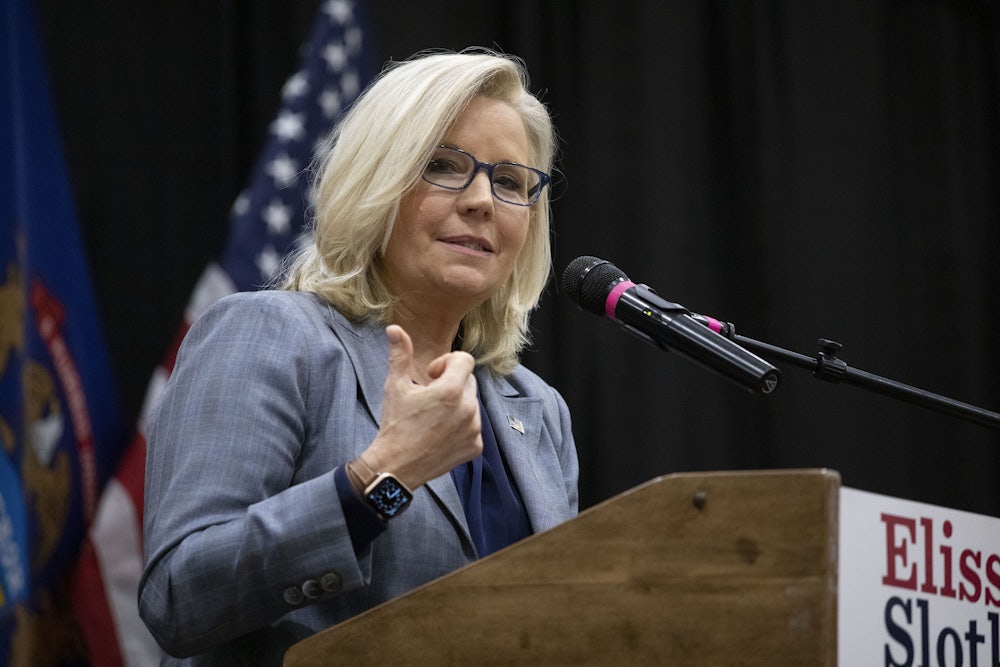Democrats’ surprisingly strong showing in Tuesday’s general election—the most successful midterm for a Democratic president in modern history—has rightly left many in the media’s pundit class with egg on their face. After weeks of breathless prophecies of a “red tsunami” on the horizon, what resulted might be better described as a “red ripple.” As of Friday morning, Republicans appeared poised to retake the House with just the slimmest of majorities, and Democrats are on track to hold onto, if not expand upon, Senate control.
But of all the so-called truisms espoused by talking heads leading up to Election Day, the election results should put to bed one of their most dangerous postulates: that Democratic voters, and Americans more broadly, are not motivated by pro-democracy messaging.
“Stop talking about democracy being at stake,” Democratic “strategist” and longtime media pundit Hilary Rosen said on CNN days before the election, as she foretold a GOP landslide. “Voters have told us what they want to hear, and I don’t think Democrats have really delivered.”
Rosen was responding to President Biden’s November 2 address at Washington’s Union Station, billed by the White House as the president’s midterm closing argument for Democrats, in which he forcefully declared that “in our bones, we know democracy is at risk.”
Commentators seized on both the setting and the substance of Biden’s remarks, contending that the president’s “defending democracy” message has “already shown limits.”
In reality, Democrats were most successful in the races where they clearly and consistently articulated the threat of Republican authoritarianism: John Fetterman and Josh Shapiro in Pennsylvania, Maggie Hassan in New Hampshire, Gretchen Whitmer and Jocelyn Benson in Michigan, Tony Evers in Wisconsin, Steve Simon in Minnesota, and Maggie Toulouse Oliver in New Mexico. Each emerged victorious against GOP challengers who denied or questioned the results of the 2020 election.
In exit polls, nearly eight in 10 voters said they felt “confident” in the fairness and accuracy of elections, with 68 percent indicating that they felt democracy was under attack. And in several key races, Democrats relied on an unlikely messenger to hammer home the message of their opponents’ extremism: outgoing Republican Representative Liz Cheney.
Cheney, vice chair of the House select committee investigating the January 6 insurrection, has become something of a crusader against Trump and others in her party who continue to push falsehoods about 2020. A week before the election, she went so far as to endorse and campaign for several Democrats facing election deniers as opponents.
“This is, by the way, the first time I have ever campaigned for a Democrat, and I have to tell you that it was not a hard decision at all,” Cheney said to a packed high school gym in East Lansing, Michigan, where she was stumping on behalf of vulnerable Democrat Representative Elissa Slotkin.
“If we want to ensure the survival of our republic, we have to walk away from politics as usual,” Cheney said. “We’re going to vote for the people in the other party.”
Slotkin was facing GOP state Senator Tom Barrett in an R+2 district, a race considered a “toss-up” by Cook Political Report. Barrett, who questioned the results of the 2020 election, was endorsed by Harriet Hageman, another Trump-backed election denier, who ousted Cheney from her Wyoming House seat. “The path to a Republican majority goes right through this district,” former Vice President Mike Pence told voters there a week before the election.
Barrett lost to Slotkin by over five points. Exit polls showed 79 percent of Michigan voters felt confident in the safety of the state’s elections. In her victory remarks, the Michigan congresswoman highlighted Cheney’s endorsement and the role of pro-democracy messaging.
“When we brought Liz Cheney to the district, we were talking about democracy as sort of a fundamental issue to kitchen table issues,” Slotkin said. “If you don’t have a good foundation—you know, weak beams and a bad concrete pad—the place is going to collapse. But I think we all need more work on that, because that’s what people are focused on.”
Beyond Slotkin, Cheney also endorsed Representative Abigail Spanberger in a bellwether race against Republican Yesli Vega, who has cast doubt on the 2020 election. Spanberger won by four points.
In Arizona, Cheney’s PAC ran ads against Republican gubernatorial candidate Kari Lake and secretary of state hopeful Mark Finchem—two of the most prominent election deniers running in 2022. Democrats appear poised to win both seats, though the races have yet to be called.
It wasn’t all good news. Over 160 election deniers on the ballot across the nation were projected to win House, Senate, or statewide positions, according to a Washington Post tally. Among them was J.D. Vance, the Trump critic turned MAGA diehard who falsely alleges fraud in 2020. Cheney had endorsed Tim Ryan, Vance’s opponent.
Overall, though, the election results paint a picture of a nation concerned about threats to democracy and willing to show up to defend it. Naturally, talk is only the first step. Democrats and others concerned about the backsliding of American democracy must also act to prevent future threats to it. And they’ve only got two months to do so before the likely Republican majority assumes House control.
Still, if Democrats learn anything from Tuesday, it’s that they should lean more into pro-democracy messages that plainly lay out the stakes if GOP election deniers take charge. Biden said as much in his postelection address Wednesday. “Our democracy has been tested in recent years,” Biden said from the White House. “But with their votes, the American people have spoken and proven once again that democracy is who we are.”










